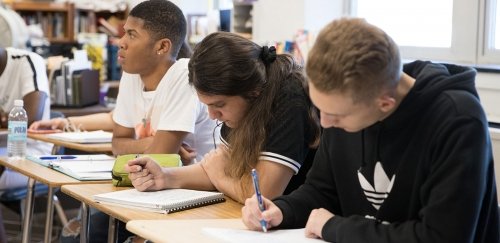Effective writing nearly always relies on a process that is somewhat dependent on the writer and rhetorical situation (a timed essay exam, for example, might allow for fewer significant revisions; a white paper might require a great deal of research).
Upon successful completion of FYW 100/100P/100H, students should be familiar with the following concepts and should have had opportunities to employ each of them during the semester. While elements of the writing process are listed here in a manner that may convey chronology or linearity, each concept may be employed at different points in a writing task; repeatedly; or not at all. And each concept loops back to another: research can be an invention strategy, while editing might lead to revision. Finally, a student’s ability to reflect on their writing process and rhetorical choices throughout that process, and to write, research, revise, or edit in response to such reflections, is critical. Responding to such reflections is an integral part of a writer’s process.
Invention
Definition: This category is often called the pre-writing stage of writing and often involves heuristics such as brainstorming, freewriting, pre-writing, mapping, outlining, etc. But the label of “pre-writing” suggests that invention is the first task of writing; in reality, students may be called upon to invent and reinvent for a number of reasons.
FYW: In FYW courses, students should be offered:
- time and space to explore concepts
- opportunities to try out new ideas
- opportunities to build on the work and ideas of others
- opportunities to discover areas of inquiry-based on data and research
- opportunities to draw on prior knowledge and cultural experiences
Research
Definition: The “Framework for Information Literacy for Higher Education” is a comprehensive document that works to define research. For the purposes of FYW, we emphasize the introductory nature of the course and the iterative nature of research. Research is the access, evaluation, and use of information from beyond the writer/author’s personal knowledge. Research can inform all stages in a student’s writing process.
FYW: In FYW courses, students should engage in discussion and practice concerning:
- what constitutes a credible source for each student’s project
- how one might evaluate sources for their credibility, usefulness, and accuracy
- how students might search (and re-search) for credible information
- how students might work credibly with the ideas of others in the student’s own text (summary, paraphrase, quotation, insertion, etc.)
- how research in academic disciplines, for difference purposes, audiences, and genres, might affect how one conducts, locates, and uses research
- why attribution and citation are important, with an understanding that different rhetorical situations call for different types and kinds of attribution and citation
Drafting and Revision
Definition: Drafting is the act of writing or creating version(s) of a text. Drafts can be exploratory, unfinished, unpolished, and unedited; they often are part of the invention process. Revision is the act of reviewing/re-envisioning a draft in order to make changes to the draft, ideally in light of audience feedback; writers revise in order to better respond to a rhetorical situation in both content and style. The goal of revision, in general, is to produce more effective texts.
FYW: In FYW courses, students should be encouraged:
- to draft as many versions of a text as practical in a given semester/session
- to revise each draft carefully and deliberately
- to see earlier drafts as often incomplete and messy
- to distinguish between the conventions of a draft and that of a finished text
- to distinguish between revising and editing
- to solicit feedback from audience members, in a variety of ways: written and verbal comments; peer review sessions; individual and group conferences
- to use feedback to create more effective drafts through revision
- to move from revision to submission of draft
Proofreading and Editing
Definition: Proofreading is the practice of rereading/reviewing/revisiting a text with an eye towards surface-level clarity; it may require a review of grammar, mechanics, usage, design, and conventions. Editing is the practice of making surface-level changes to a text, often in response to careful proofreading.
FYW: In FYW courses, students should be encouraged:
- to see proofreading and editing as often one of the final steps in the writing process—that proofreading and editing should not interfere with invention, drafting, revision, or research
- to consider issues of correctness and standardization as social conventions
- to distinguish between global and local issues in writing
- to understand that issues of grammar, mechanics, usage, design, and convention are not always about correctness, but are rather about purpose, audience, and ethos
- to see technology as one of several tools writers employ when proofreading and editing



